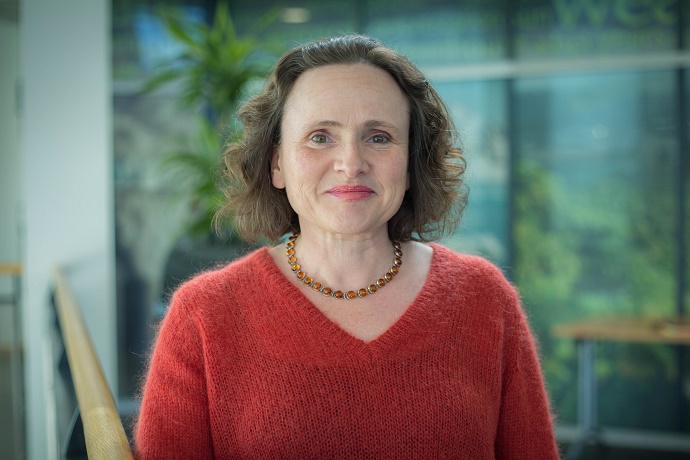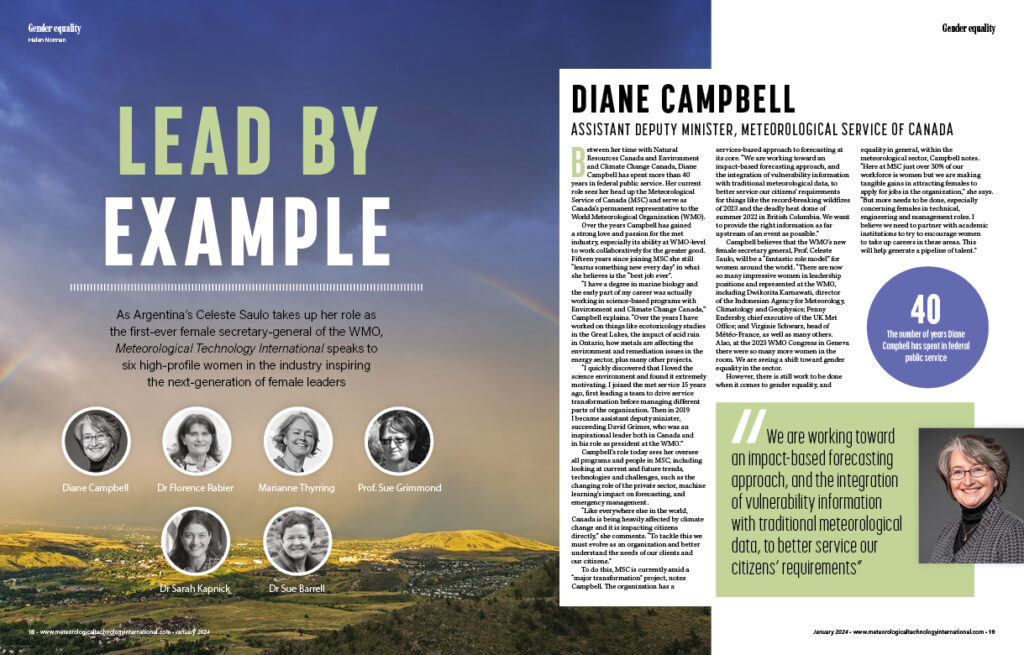Penny Endersby, chief executive of the UK Met Office, has said weather forecasts based on artificial intelligence (AI) can’t be used on their own for now, even though they may ultimately replace traditional forecasting methods. She also points to the advances made in sex equality in weather services, while highlighting how more remained to be done on class and race.
Can you tell us a little bit about your career and your move to the Met Office?
I have a physics degree and, when I graduated, I definitely wanted to work in science. Most of my career was in the defense sector, more specifically in armor research. When I led my first team, I found I enjoyed managing people and having more resources to play with. I progressed up the management ladder and ended up as the director of the UK Ministry of Defence’s Cyber and Information research. Then the Met Office job came up, and it had everything I wanted. All this time, what has motivated me is doing fantastic science and turning it into products that matter. The Met Office has a wonderful mission that would let me do that, and I took up the role of chief executive of the Met Office in 2018.
What are the main activities of the UK Met Office?
Of course, we predict the weather: we collect observations, we have the assimilation step that tells you the starting point of the atmosphere, and we have a big computer and a model that runs on it. In terms of climate, we have moved from just establishing what is causing climate change to questions of impact and adaptation. We also do post-processing to produce usable products, and we get those into the hands of customers. In addition, we are one of two world area forecasting centers for high-level air traffic around the globe and one of nine volcanic ash advisory centers, and we do space weather, too. We also have a school program to help educate young people in the weather and climate, and we work with developing nations to help them be more capable.
How can national weather services, such as the UK Met Office, and ECMWF benefit from each other?
All national weather services of the member states benefit from ECMWF’s products, and if we didn’t benefit, we wouldn’t be member states! Your core mission of providing a fantastic medium-range weather forecast is critical. It’s even more important for nations that don’t have their own global forecasts. The larger met services run their own global model, of course, but we nevertheless really value the quality of the ECMWF model. It runs further into the future than ours, and we blend it with our data in post-processed output. We also work with you to shape your strategy, and we work with ECMWF on pilot projects, where groups of nations work together. In addition, model diversity is good to have, and multi-model ensembles are valuable. On things like AI, we are learning together to move forward in the best way.
Weather forecasts based on AI are evolving rapidly. What is the UK Met Office doing in this area?
We have a small group of experts in artificial intelligence doing ground-breaking work: we’re looking at the potential of AI for developing a weather model, and there’s a model intercomparison project where we’re assessing how different machine learning models are performing. A few years ago, ECMWF gave a lecture on the future of AI in weather forecasting. It presented contrasting futures, from AI just having a niche existence to AI replacing traditional models. When the audience was asked about their view, I was the only one who suggested the latter!
But questions remain, such as how long you have to run an AI model before you can have confidence in its results on extremes. For now, we can’t switch off the physical model, although I think we might eventually. We have a much bigger group who are using machine learning tools for aspects of their work, such as working out where to place a sensor where sensors are scarce or validating satellite observations. We also have a program we call ‘AI for all’, to help us do routine business tasks more effectively.
The UK isn’t in the European Union anymore, but last year it reached an agreement on the association of the UK to the EU’s Copernicus services. How can the UK benefit from the Copernicus services run by ECMWF, and how can they benefit from the UK Met Office’s work?
I’m really delighted the UK has reassociated with Copernicus and the EU’s Horizon research program. This is mutual – we’re both a contributor and a beneficiary of Copernicus. We use their high-quality Earth observation data for a multitude of use cases, and we contribute for example to the seasonal prediction side by providing our own high-quality data and expertise. We really hope we’ll be in a position to engage further again.
As the current president of the ECMWF Council, what are the main items on the agenda for the year ahead?
I’ve only just taken over as president of the council. The number one job is to chair the council. Items that will come up during my presidency are ECMWF’s new strategy, of which AI will be a big part, and the fact that you’ve got big building projects in Bonn (Germany), and in Reading (UK). In the long term, there will be a new ECMWF climate reanalysis, ERA6, which has gone up the agenda because of the way everybody is using ERA5 to train AI models.
What can weather services do to help create a level playing field for men and women?
All around the world, we know that children and women suffer more from severe weather events and climate change than men. That means just providing a good forecast can help to create a more level playing field. In terms of our staff, I think weather services are a shining example of good employment rates and promotion rates of women. If you look at the ECMWF Council, it’s not far off 50:50, with ECMWF and the three largest met services all led by women. By contrast, we are absolutely rubbish on class and race. There may be women, but they are white, middle-class women, so I think there’s a wider diversity agenda to consider. We should roll out what’s made us a good employer of women to some other aspects.
This article was originally published by ECMWF. Read the original here.
For the January 2023 issue, Meteorological Technology International spoke to six high-profile women in the industry who are inspiring the next-generation of female leaders. To view the magazine in full, click here.




